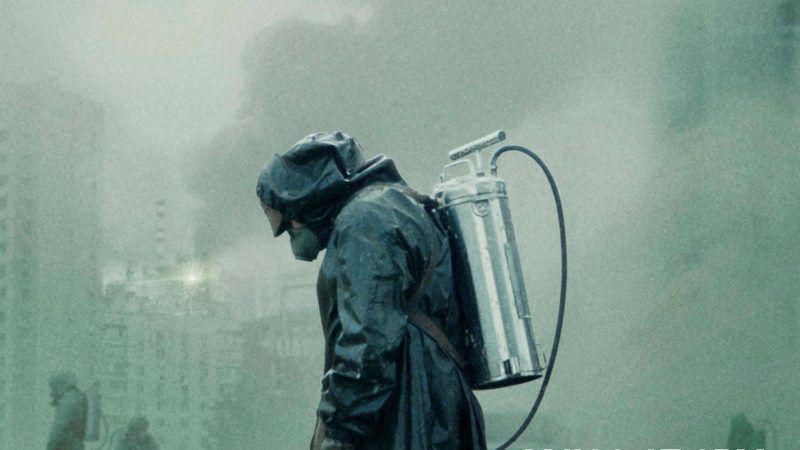HBO's Chernobyl Highlighted Government Malfeasance and Administrative Evil
The show wasn't about a nuclear disaster per se, but about how a government—and individuals—reacted in the face of disaster.

One of the most gripping and remarked-upon scenes from the recent HBO miniseries "Chernobyl" came shortly after the nuclear reactor exploded and officials from the plant and government assembled in a meeting room to assess the situation and come up with a response. Do they tell the locals? Do they evacuate the nearby town?
One official argued against inciting panic and assured the group things are under control. Another man presented a dire scenario, and pointed to glowing air, a raging fire, people with burns and workers vomiting. The bureaucrats were in denial. Then an old Soviet apparatchik starts tapping his cane to get everyone's attention and makes his pronouncement:
"How proud he (Soviet revolutionary V.I. Lenin) would be of you all tonight," he said. "The passion you have for the people. For is that not the sole purpose of the apparatus of the state? Sometimes we forget. Sometimes we fall prey to fear. But our faith in Soviet socialism will always be rewarded. Now, the state tells us that the situation here is not dangerous. Have faith, comrades." The group cheered.
And, so, officials downplayed the 1986 Ukraine disaster, squandering precious response hours—until two outspoken scientists and an open-minded government official begin investigating the mess and insisting on a more aggressive response.
There's been much debate about the popular and well-done series. I heard one complaint that the series started with the nuclear explosion rather than building up to the cataclysmic event, but that was the fundamental strength of the production. The show wasn't about a nuclear disaster per se, but about how a government—and individuals—reacted in the face of disaster.
Other critics have ridden their hobby horses. Pro-nuclear environmentalist Michael Shellenberger complained in Forbes, "I think it's obvious that the mini-series terrified millions of people about the technology." He picked on some inaccuracies in the series' presentation of the effects of radiation poisoning and criticized it for repeating an "urban legend."
Perhaps, but I agree with the tweet that Shellenberger reprints from the show's creator: "The lesson of Chernobyl isn't that modern nuclear power is dangerous. The lesson is that lying, arrogance, and suppression of criticism are dangerous." Indeed, "Chernobyl" is not about nuclear power, but about government malfeasance and "administrative evil." That refers to the way average people can do atrocious things if they are done under the auspices of legitimate authority. It refers to those who were just following orders.
A fascinating corollary is how people can do brave and selfless things within those same corrupt systems. My favorite character in "Chernobyl" was Boris Shcherbina, a high-ranking deputy chairman of the Council of Ministers. He was, as History.com put it, "an old hand in the ways of the system, its patterns of absurd quotas and preposterous deadlines."
Shcherbina had no expertise in nuclear issues, yet was called to manage the situation. Instead of blindly following the party line, he took seriously the concerns of the scientists and worked within that absurd system to provide the tools needed to get the fire under control. The show spotlighted other heroes, too, such as the coal miners who risked their lives to tunnel under the reactor and the other workers who did what they had to do at great personal cost.
The most entertaining response to the "Chernobyl" series came from Russia. Moscow Times columnist Ilya Shepelin writes that "pro-Kremlin media have launched a mini-crusade against it" based largely in their shame "that an American, not a Russian, TV channel tells us about our own heroes." A Russian production company is producing its own movie alleging that a CIA operative was sabotaging the plant, thus inadvertently showing the continuing relevance of the plotlines.
Americans have their own takes, of course. "This state, run by delusional old men chasing, imprisoning, and shooting millions of their fellow citizens in a 'circle of accountability,' controlled thousands of nuclear weapons pointed at the United States and its allies," wrote Tom Nichols in the Atlantic. That view of Soviet Russia certainly is true. The series was an indictment of a totalitarian society, but it's not only an indictment of that defunct government.
Others say "Chernobyl" teaches lessons about our ongoing modern political drama. As Peter Maas wrote in the Intercept, the show tells us much about the "deceit of the Trump era" because it highlights the "destruction of truth" by a government committed to self-preservation. There's some truth there, but "Chernobyl" touches on themes that are much bigger than that.
In reality, the "Chernobyl" series is so powerful because of what it says about all bureaucracies, and not just any particular system. It's about each of us as individuals and how we would react in the face of similar dangers and official absurdities and misinformation. Would we cheer the man with the cane and follow the official process—or risk our lives to do the right thing?
This column was first published in the Orange County Register.


Show Comments (31)